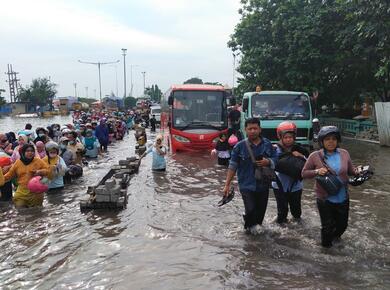Posted: May 2, 2023
Indonesia
I cannot forget the high tide flooding of 23-25 May 2022.
As pastor of GKMI Sidodadi in Semarang in Central Java province, Indonesia, I still recount the anxieties and panic of the community. Our church building is just 10 minutes’ walk from Tanjung Mas Seaport from where the flood came.
Seawater ran down so fast, hitting the pier embarkment and flooding the area. Our church and people’s settlements were flooded. The water level was as high as an adult’s hip. We were shocked, especially those who worked near the pier.
The workers panicked when they saw the seawater suddenly rushing into the factory. None of the workers came out of the factory with their clothes dry. Some even needed the help of heavy vehicles. It was very chaotic.
The breach of the water embankment (due to the great pressure and rising sea levels) inundated people’s settlements for three days.
In the afternoon, the sea began to rise and inundate residents’ settlements and the seawater began to recede again at midnight before dawn. This tidal flood took place for three days. Electricity had to be turned off. People could not work during the flood.
Not a few people were forced to move their place of residence temporarily for health and safety reasons.
Climate change culprit
According to the Meteorology, Climatology, and Geophysics Agency (BMKG), the cause of the tidal flood was the natural phenomenon of perigee, in which the earth is at the closest distance to the moon.
In recent years, the height of the sea level increased and the embankment at the port could not hold the water. It is also believed that the increase of the sea level was due to global warming.
The people of the port area knew that the coastal areas of northern Semarang and the neighbouring area of Sayung, Demak, are often hit hard by high tide floods.
Many houses in the coastal area must be abandoned by the owners because the area – which was once comfortable to live in – has been inundated by seawater.
This tidal flood disrupted the community’s activities. Daily activities were turned into activities on how to save family members and property. Many houses and household appliances suffered permanent damage.
Today, we are grateful that the embankment was repaired so that the seawater cannot hit our homes. Community activities have returned to normal. The people, however, need to be vigilant because unexpected tidal floods can take place at any time. We are aware that the increasing volume and pressure of seawater amid global warming and climate change can destroy our neighbourhood again.
Bearing one another’s burdens
During the high tide hit, 55 families of the GKMI congregation who live around the church suffered from the disaster. Some of them were forced to flee to another safe place.
On the first and second day of the flood, these families could not have sufficient food because their houses were inundated by seawater. On the third day, the condition improved because they began to receive assistance from different groups and other GKMI congregations.
Since my house was not inundated by seawater, I used it to cook food and distribute relief items to our congregation and surrounding communities affected by the disaster.
We received daily needs items such as rice, eggs, noodles, cleaning supplies, mattresses. Our members packed and distributed these items to the 55 families and to other survivors in our community.
It was heartwarming to see that our church members, although they experienced difficulties because of the flood, could help each other and the others across religious and ethnic boundaries.
I believe that God wants us to serve one another with love in times of trouble. The apostle Paul says that we must “bear one another’s burdens” because in this way we shall “fulfill the law of Christ” (Galatians 6:2-5). God’s power was shown to our congregation during the tidal flood. We not only serve our members but also those in need.
As I contemplate the natural disaster, I can see that the ministry of love invites us to bring about justice toward others. But I also know that the breach of the embankment shows that nature and our environment are not doing well.
No matter how solid the embankment is built, one day it will not be able to contain the strong waves and sea pressures of which volumes continue to increase as a result of global climate change.
Our earth is suffering. Human behaviour has caused ecological damage. In addition, our greed brings about exploitations on earth. As God’s people, we must remember that God gave humans the duty and responsibility to “work and care for” the earth and all that is in it. We must not destroy the earth’s riches. We must restore these. If nature is angry, humans will receive its consequences.
—Basaria Dwi Febrina Sianturi serves at Gereja Kristen Muria Indonesia (GKMI) Sidodadi in northern Semarang, Central Java, Indonesia.



Comments: